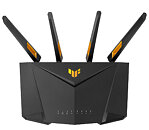- Joined
- Oct 9, 2007
- Messages
- 47,895 (7.38/day)
- Location
- Dublin, Ireland
| System Name | RBMK-1000 |
|---|---|
| Processor | AMD Ryzen 7 5700G |
| Motherboard | Gigabyte B550 AORUS Elite V2 |
| Cooling | DeepCool Gammax L240 V2 |
| Memory | 2x 16GB DDR4-3200 |
| Video Card(s) | Galax RTX 4070 Ti EX |
| Storage | Samsung 990 1TB |
| Display(s) | BenQ 1440p 60 Hz 27-inch |
| Case | Corsair Carbide 100R |
| Audio Device(s) | ASUS SupremeFX S1220A |
| Power Supply | Cooler Master MWE Gold 650W |
| Mouse | ASUS ROG Strix Impact |
| Keyboard | Gamdias Hermes E2 |
| Software | Windows 11 Pro |
ASUS today introduced the TUF Gaming AX3000 V2 wireless router. The Wi-Fi 6 router offers not just characteristic TUF Gaming product design, but also durability, in the way of multi-level heatsinks for the various hot components underneath, with a "nano-carbon coating." As a router, its specs are pretty mainstream—you get up to 2.4 Gbps in the 5 GHz band, up to 576 Mbps in the 2.4 GHz band (which add up to the "AX 3000" nameplate). The wired networking consists of a 2.5 GbE WAN port, and four 1 GbE LAN ports, from which two ports can be aggregated to a 2 Gbps link when paired with a machine that has two 1 GbE ports. You also get a 5 Gbps USB 3.x type-A port that can turn any USB mass-storage device into a network share, or be used to share a printer; and security in the way of the latest WPA3. The company didn't reveal pricing.





View at TechPowerUp Main Site





View at TechPowerUp Main Site




